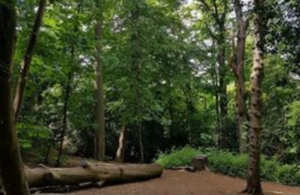Grant to boost domestic tree production re-opens
£5 million available for tree and seed suppliers of all sizes and from any sector to expand and modernise

Trees in a woodland setting
Investment in domestic tree production in England will be accelerated today (11 April) with applications re-opening for the Forestry Commission’s Tree Production Capital Grant. The funding will drive the production of tree seed and saplings through developments in machinery, automation and the expansion of facilities.
In line with the aims of the England Trees Action Plan and Government ambitions to treble tree planting rates by the end of this Parliament, the Tree Production Capital Grant will support efforts to build nursery capacity and grow long-term tree seed and sapling supply.
The grant will enable suppliers to boost production rates at pace and has been designed to complement the Tree Production Innovation Fund, which provides support for research projects that enhance UK tree production methods.
Previous funding rounds have provided machinery for projects such as the Emmaus Community Tree Nursery in Cornwall to help it meet the need for locally grown trees and provide employment opportunities for homeless people. Funding has also supporting Warwickshire County Council expand and improve their tree nursey expansion and improvement so they can diversify the species they grow and adapt to future climate conditions.
Successful projects will be awarded up to £175,000 in grant funding to cover up to 50% of costs, with money coming from the Tree Production Capital Grant as part of the Government’s £750 million Nature for Climate Fund. In comparison to the 2022 application process, the minimum grant value which can be applied for has reduced from £10,000 to £5,000 enhancing accessibility for smaller projects.
Examples of eligible projects include investments in seed trays, developments in machinery such as transplanting systems and grading machines, improved polytunnel infrastructure and irrigation systems, or in biosecurity through improved water treatment and refrigeration equipment. Applications are encouraged from tree seed and sapling suppliers of all sizes and sectors, as well as new entrants looking to diversify into the area.
Forestry Minister Trudy Harrison said:
This Government is committed to bolstering domestic tree production and fostering a robust forestry industry – actions that are necessary to realise our long-term tree- planting goals.
Not only does the Tree Production Capital Grant allow us to modernise and enhance the sector, but it also helps to create new green jobs and to tackle climate change, amongst myriad other benefits.
Forestry Commission Chief Executive Richard Stanford said:
Funding projects that enhance our woodlands and treescapes is fundamental to achieving Government’s tree planting ambitions and building an innovative and robust forestry sector.
Through the Tree Production Capital Grant we have been able to support existing tree and seed suppliers of all sizes, and also provide funding to those wishing to make a start in the sector. With the application window now open, I encourage those with relevant projects to apply.”
The second round of the Tree Production Capital Grant is now open until 31st May 2023. and will provide up to £1.76 million of funding during 2023/24 and £3.43 million during 2024/25, subject to successful bids. Applicants can apply for projects up to two years long, ending in March 2025.
The Forestry Commission will be hosting a webinar on the grant application process on Friday 28 April.
For more information and to apply, go to: https://www.gov.uk/guidance/tree-production-capital-grant
To receive the latest news on the grant, sign up to the Forestry Commission’s e-alert.
Further information
- The Tree Production Capital Grant will distribute funding between 2023/24 and 2024/25.
- To be eligible for funding, applicants must be UK-based and will need to demonstrate how the grant will be used to increase English tree seed or sapling supply. Projects must have a minimum total cost of £5,000 to be eligible.
- There is a maximum of one bid allowed per applicant.
- The England Trees Action Plan committed to treble tree planting rates in England by the end of this Parliament, supported by more £750 million through the Nature for Climate Fund to be spent by 2025 on peat restoration, woodland creation and management – above and beyond what was promised in the manifesto.
CASE STUDIES
Emmaus Community Tree Nursery at Trewoon
Emmaus Community Tree Nursery is a new nursery in Cornwall aiming to meet the need for locally grown trees, generate income to support people out of homelessness, and provide volunteer opportunities. They were awarded TPCG funding towards machinery - including a tree planter, undercutter, and second-hand tractor - to help mechanise their operation and maximise their production capacity. In addition, they will be building on-site infrastructure, including welfare facilities for staff and volunteers. This will allow them to provide nature-based volunteering opportunities for the local community.
Warwickshire County Council
Warwickshire County Council applied to the TPCG to improve, expand, and mechanise their council run tree nursery. Their successful proposal included funding towards polytunnels and an automated irrigation system, allowing them to create a controlled environment for growing saplings. The project also involves building a workshop which, will enable them to store and stratify their own seed. Following the investments, they hope to be able to diversify the species they grow, with a focus on those adapted to the urban environment and to predicted future climate conditions.
Trees Please Ltd
Trees Please is a bare root nursery in the north of England, selling trees, hedges and shrubs. They successfully applied to the TPCG for a bespoke grading machine. Grading - a labour-intensive, repetitive, and often unpleasant task - has been a major barrier to the nursery’s expansion. The new machinery will help to automate parts of this process, increasing the nursery’s overall capacity, freeing up staff time, and improving the working environment. Much of the extra capacity resulting from the project will be focused on increasing the growth and diversity of broadleaved species.